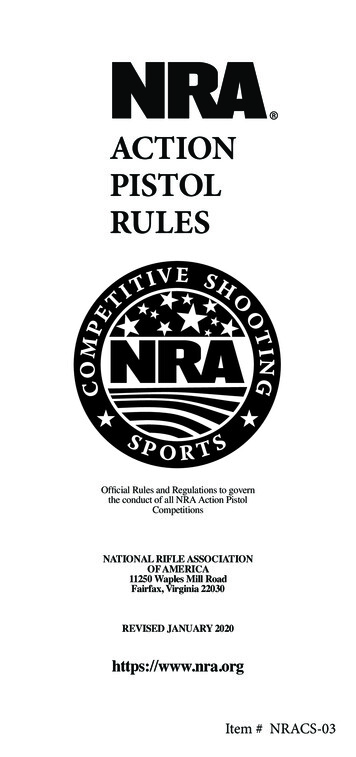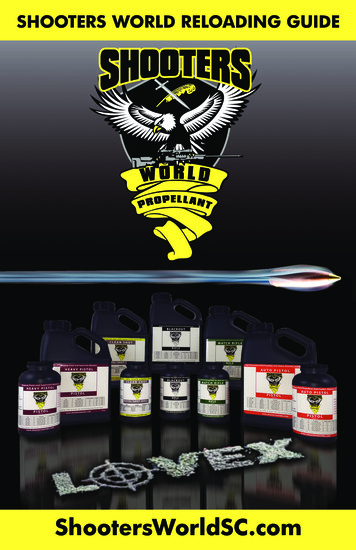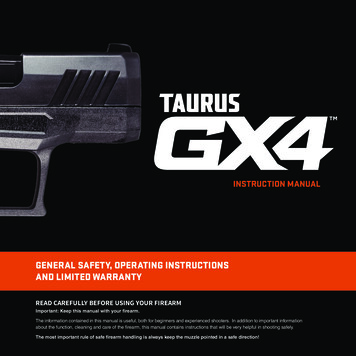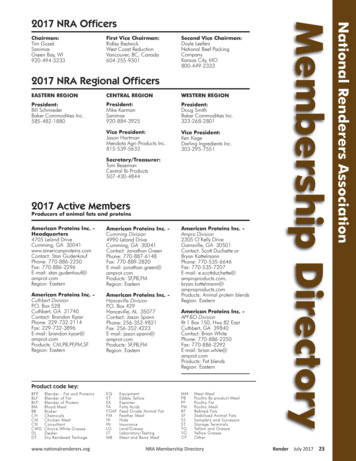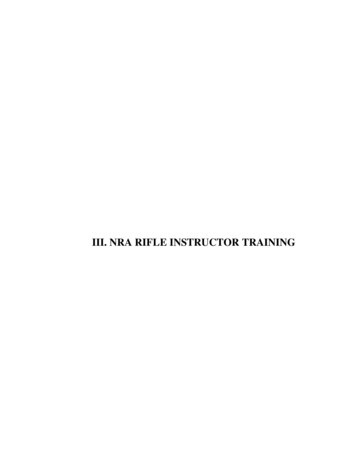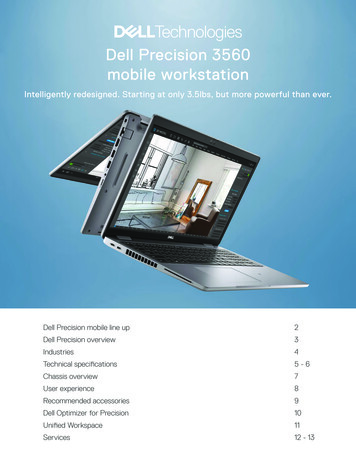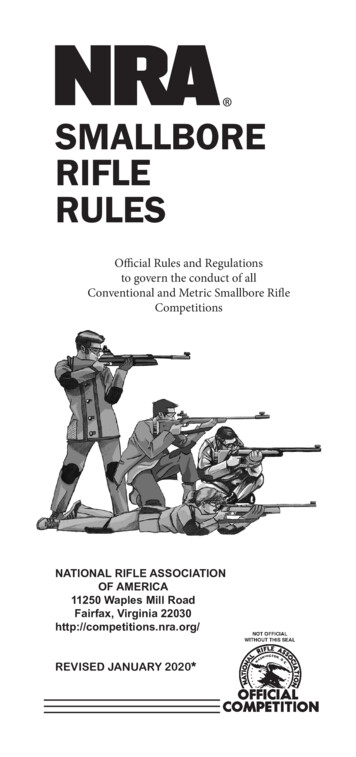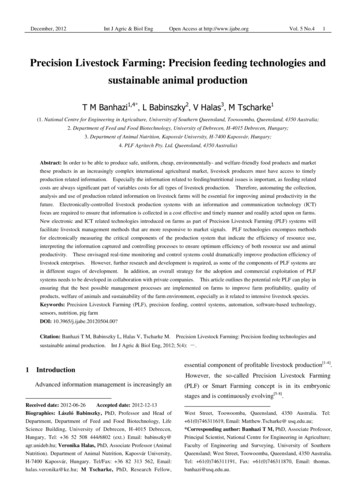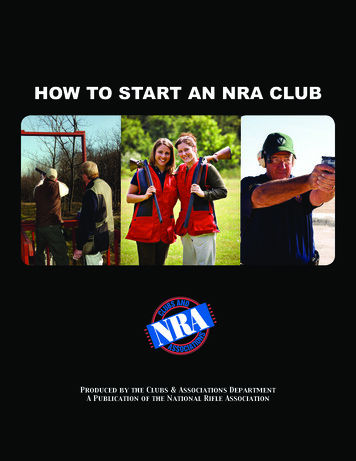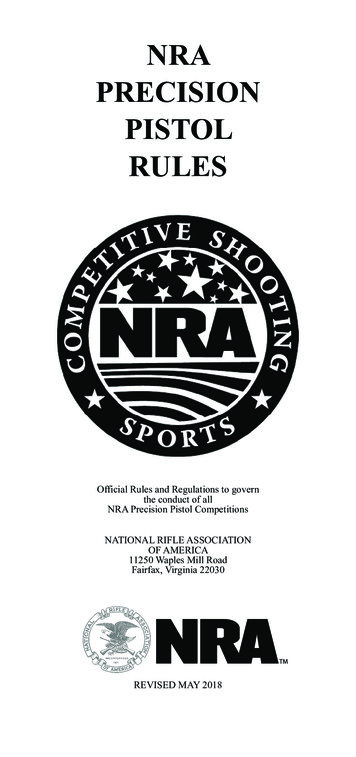
Transcription
NRAPRECISIONPISTOLRULES(Competitive Shooting Sports Logo)Official Rules and Regulations to governthe conduct of allNRA Precision Pistol CompetitionsNATIONAL RIFLE ASSOCIATIONOF AMERICA11250 Waples Mill RoadFairfax, Virginia 22030REVISED MAY 2018
CONTENTSNRA PRECISION PISTOL RULESApproved and Registered Tournaments.ivSec.1. NRA Competition.1Sec.2. Eligibility of Competitors .4Sec.3. Firearms, Equipment and Ammunition .9Sec.4. Targets .14Sec.5. Positions .15Sec.6. Range Standards .16Sec.7. Courses of Fire .18Sec.8. Time Limits .19Sec.9. Competition Regulations .19Sec.10. Range Commands Control and Operations .24Sec.11. Tournament Officials .28Sec.12. Team Officers and Duties .33Sec.13. Physically Disabled Shooters .34Sec.14. Scoring and Marking .35Sec.15. Decision of Ties .38Sec.16. Challenges and Protests .40Sec.17. National Records .42Sec.18. Competitors’ Duties and Responsibilities .44Sec.19. National Pistol Classifications .46Sec.20. NRA Official Referee .50Sec.21. NRA Competition Programs .52Sec.22. .22 Caliber Only Aggregate Match .54Sec.23. NRA Distinguished Revolver Program .55Sec. 24. One or Two Hand Probationary Pistol Match.56Appendix. General Regulations .57Glossary.61Index .66iii
APPROVED AND REGISTEREDTOURNAMENTSNRA Sanctioned Tournaments-See Rule 1.6Application forms for both types of Sanctioned Tournaments maybe obtained from the NRA. Official application for approval toconduct an NRA Approved or Registered Tournament must bemade to the Competitions Division. The deadline, in advanceof firing date for receipt of the completed application forms andprograms, is 30 days for Approved, and 45 days for RegisteredTournaments. In order to obtain publicity in the Coming Eventscolumn of SHOOTING SPORTS USA, dates must be received andsanctioned by NRA by at least 90 days prior to the firing date. SeeGeneral Regulations for SHOOTING SPORTS USA deadlines. ARegistered Tournament is the more formal of the 2 types. Differences between the 2 types of competitive tournaments are:ivApprovedRegisteredRuleScores used for classificationYesYes19.4Scores used for NationalRecordsNoYes17.5NRA registration fee percompetitor (remitted afterthe tournament is fired).YesYesGen’lReg. A7,B7Competitors must be NRAmembers.NoNo1.6(f)(g)Minimum number of shotsrequiredNoYesGen’lReg. A6,B6NRA classification or category system must be usedOptionalYesGen’lReg. A5,B5This is explained in sponsor’s packetNRA ID Number is required for classification purposes in allNRA Sanctioned Tournaments. Should a competitor not be an NRAmember, he will be assigned a special number which allows his scoresto be entered into the computer.Fixed award scheduleNoYesGen’lReg. A6,B6Tournament Officials competingYesYesGen’lReg. A8,B8Official Referee may beassigned by NRANoYes, withexceptionsGen’lReg. B9Sponsor required to furnish each competitor withOfficial BulletinNoYesGen’lReg. B12Program prepared and distributed by SponsorYesYesGen’lReg. A1,B1
NATIONAL RIFLE ASSOCIATIONOFFICIAL RULES FORPRECISION PISTOL MATCHESOfficial Rules and Regulations to govern the conduct of all Precision Pistol Matches. These rules establish uniform standardsfor NRA sanctioned pistol competition. Where alternatives areshown, the least restrictive conditions apply unless the tournament program sets forth limitations. The rules do not apply toInternational Shooting Union type competition. They supersedeall earlier editions and remain in effect until specifically superseded. Tournament sponsors may not alter these rules. If sponsorsrequire additional rules for special conditions, the additions mustbe fully set forth in the program for the competition concerned.The arrangement and rule numbering systems are such thatcorresponding rules for other types of NRA competition are correspondingly located and numbered in the Rule Books for thosecompetitions. Gaps in the sequence of rule numbers result fromthere being a rule in one or more of the other Rule Books that doesnot apply in this book. Recommendations for rule changes may beforwarded to the Pistol Committee in care of the National RifleAssociation.1. NRA COMPETITION1.0 NRA Competition - Competition that is authorized in advance of firing by the National Rifle Association. The program,range facilities and officials must comply with standards established by the NRA. The types of tournaments which are sanctioned are listed in Rule 1.6.1.1 Sanctioned Tournament - A series of matches covered byan Official Program. Such matches may be all individual matches,all team matches, or a combination of both, which must be conducted by an NRA affiliated club or organization. They may beall fired matches or a combination of fired and aggregate matches.A tournament may be conducted on one day, or successive days,or may provide for intervening days between portions of the tournament, such as tournaments programmed to be conducted overmore than one weekend.1.2 Authorization - Before being publicized in programs orotherwise, the sponsoring organization of each type of competition mentioned in Rule 1.6 shall have agreed to comply with thecurrent regulations for such competition and shall have receivednotice from the NRA that the competition applied for has beenauthorized.1.3 Rules - The local sponsor of each type of competition mustagree to conduct the authorized competition according to NRARules, except as these Rules have been modified by the NRA inthe General Regulations for that type of competition.1.4 General Regulations - The local sponsor of each type ofcompetition must agree to comply with the General Regulationspublished by the NRA for the competition concerned. See Appendix in back of this rule book.1.5 Refusal or Withdrawal of NRA Authorization - TheNRA may refuse to authorize or may withdraw its authorizationfor any competition that cannot, or does not, comply with the requirements for that competition1
1.6 Types of Tournaments - The types of tournaments listedbelow are those that are sanctioned by NRA in its competitiveshooting program.(a) International Matches - Arranged by the NRA with therecognized national shooting organization(s) of the countries concerned. The officials thereof are appointed by theNRA.(b) International Team Tryouts - U.S. tournaments conductedunder NRA Rules organized or authorized by the NRA aspreliminary or final tryouts for the selection of International Team members. The officials thereof are appointedby the NRA.(c) National Championships - Organized by the NRA, and insome cases in conjunction with the Corporation for thePromotion of Rifle Practice and Firearms Safety, to formthe National Matches. The officials thereof are appointedby the NRA, in some circumstances in cooperation withthe CPRPFS. These tournaments will be registered.(d) Regional and Sectional Championships - Arranged between the NRA and a local sponsoring organization.These tournaments will be registered.2(e) State Championships - Annual tournaments authorizedand/or conducted by State Rifle and/or Pistol Associations, affiliated with the NRA. Such State Associationsmay if desired, authorize local organizations to sponsorand conduct State Championships. In states where there isno NRA affiliated State Association the NRA may authorize a local organization to sponsor and conduct the StateChampionship. State Championships will be RegisteredTournaments.(f) Registered Tournaments - May be authorized by the NRAafter application has been filed by the sponsoring organization. Application forms are available from NRA onrequest; National Records may only be established inRegistered Tournaments (Rule 17.1).(g) Approved Tournaments - May be authorized by the NRAafter application has been filed by the local organizationthat will act as the sponsor. Application forms are available from NRA on request.(h) Sanctioned Leagues (shoulder-to-shoulder or postal) May be authorized by the NRA after application has beenfiled by a local group or organization. Application formsare available from NRA on request. Sanctioned Leaguescores are used for classification. A League need not beoperated by an Affiliated Club or Organization.(i) Postal Matches - Organized by the NRA and publicizedto groups concerned through the Shooting Sports USA,announcements and/or special mailings.(j) Special Tournaments - May be sanctioned by NRA fortypes of shooting not otherwise a part of the NRA program.(k) State and Senior Games - Tournaments that are part ofthe State and Senior Game program. Such tournamentsare not charged fees, nor will any scores fired be used forclassification. A simplified sanctioning procedure may be
used, and they will be listed in Coming Events with theonly contact being the State Coordinator.(l) NRA Distinguished Revolver Match - May be authorizedby the NRA after an application has been filed. Application forms are available from NRA upon request.The NRA National Match Course will be used for allcompetitions under this program. Tournaments wishingto host competitions under this program are limited toNational Championships, Regional Championships andState Championships, as defined in Rule 1.6 which areconducted outdoors.1.7 Types of Matches (a) Match - A complete event as indicated in the programfor the awarding of certain specific prizes. A match mayconsist of one or of several stages. It may, in the case ofaggregate matches, include the scores fired in several subsidiary matches.(b) Stage - A portion of a match that consists of one or morestrings fired in one position, distance, time allowance(slow or rapid fire, for example), or target.(c) Open Match - A match open to anyone, except that if sostated in the program an open match may be limited to oneor any combination of the following: (a) United Statescitizens; (b) members of the National Rifle Associationof America; and/or (c) with respect to non-U.S. citizens,(d) persons who are members in good standing of theirrespective National Shooting Federations or Associations.(d) CPRPFS (‘’Leg’’) Matches - The Corporation for thePromotion of Rifle Practice and Firearms Safety (CMP)sponsors Excellence in Competition (‘’Leg’’) Matchesthat are organized and conducted under the direction andrules of the CMP in conjunction with NRA Regional andState Championships. In addition, the CMP authorizes theNRA to conduct the National Trophy Matches in conjunction with the NRA National Championships. The combined events are titled ‘’The National Matches’’. All CMPmatches are conducted in accordance with rules and regulations contained in CMP Competition Rules & Regulations in its current form. They are not NRA SanctionedMatches, and scores are not used for classification.(e) Restricted Match - A match in which competition is limited to specified groups, i.e., juniors, women, police, civilians, veterans etc.; or to specific classes, i.e., High masters, Masters, Experts, Sharpshooters, Marksmen, etc.(f) Classified Match - A match in which awards are given tothe winners 3 and to the highest competitors in severalspecified classes such as High Masters, Masters, Experts,Sharpshooters, and Marksmen. The classification of competitors may be accomplished by the National Classification System (Sec. 19) or by other means. The program forclassified matches must specify the groups or classes inwhich awards will be made.(g) Invitational Match - A match in which participation is limited to those who have been invited to compete.(h) Squadded Individual Match - A match in which eachcompetitor is assigned a definite relay and target by the3
Statistical Office. Failure to report on the proper relay orfiring point forfeits the right to fire. All entries must bemade before firing commences in that match, except whenotherwise stated in the tournament program.(i) Unsquadded Individual Match - A match in which thecompetitor is not assigned a definite relay or target by theStatistical Office. The competitor report to the Range Officer within the time limits specified in the program andthen is then assigned to a target and a relay in which tofire.(j) Re-Entry Match - A match in which the competitor is permitted to fire more than one score for record; one or moreof the highest scores being considered to determine therelative rank of competitors. The number of scores thatmay be fired and the number of high scores to be considered in deciding the relative rank of competitors must bespecified in the program. Scores fired in these matchesshall not be used for classification purposes.(k) Squadded Team March - A match in which the teams areassigned a definite time to fire. Teams may be assignedone or more adjacent targets. All entries must be madebefore firing commences in that match. The entire teammust report and fire as a unit.(l) Unsquadded Team Match - A match in which the teamsmay report to the firing line any time within the limitsspecified in the program, targets being assigned by theRange Officer. The entire team must report and fire as aunit, unless the program provides otherwise.4(m) Aggregate Match - An aggregate of the scores from twoor more matches. This may be an aggregate of matchstages, individual matches, team matches, or any combination, provided the tournament program clearly statesthe matches that will comprise the aggregate. Entries inaggregate matches must be made before the competitorcommences firing in any of the matches making up theaggregate match.1.8 Single Firearm Tournament - The sponsoring organization of a competition described in Rule 1.6 may provide in thematch program that equipment allowed in the competition willbe limited to only some, but not all, of the equipment otherwiseauthorized by Section 3 of these rules; provided that the matchprogram may not allow the use of any equipment not authorizedby Section 3.PUBLIC AFFAIRSAll tournament sponsors are urged to give special considerationto the needs of news media personnel in order to achieve maximum publicity for the competition. Public news media personnelrepresenting print and/or broadcast should be given every consideration and cooperation in keeping with the proper conduct of thecompetition.2. ELIGIBILITY OF COMPETITORSEligibility and Categories of Competitors. The conditions of amatch shall prescribe the eligibility and categories of competitors, team or individuals, in accordance with Rule 1.6 and/or the
definitions contained in Section 2. Any limitations of eligibility tocompete must be stated in the Match Program.INDIVIDUALS2.1 Members of the National Rifle Association - Any individual member, including Benefactors, Patrons, Endowment, Life,Annual, Associate, Non- Resident and Junior members.2.1.1 Non- U.S. Citizens - Non- U.S. Citizens, who are alsonon Residents, may compete in any NRA Sanctioned Tournament,unless further restrictions are imposed by conditions stated in theprogram.2.1.2 Categories and Special Awards - If there are a sufficientnumber of competitors of a specific group (i.e., Women, Juniors,Service, etc.), a match sponsor may, at his discretion, establish aseparate category for this group and make classification awardswithin this category, such as 1st Master Service, 3rd SharpshooterCivilian, and so on. However, if there are insufficient entries of aspecific group to warrant such a separation, and if the sponsor stillwishes to provide recognition to this specific group, he may provide an overall Special Award such as High Woman, High Junior,etc., and all competitors in this specific group would be eligible forthis one Special Award. Details concerning categories and specialawards must be clearly outlined in the tournament program.2.2 Civilian - Any civilian including all members of the Reserve Officers Training Corps (ROTC, NROTC and AFROTC),personnel of the State Security Forces (e.g., State Guard organizations having no federal recognition), retired members of each ofthe several services comprising the Armed Forces of the UnitedStates, and members and former members entitled to receive pay,retirement pay, retainer pay or equivalent pay, are classified ascivilians except as noted in the example below. All competitorswho are enrolled undergraduates of any of the service academieswill be considered as civilians and may compete in collegiate andROTC categories. Individuals of any Reserve or National Guardcomponent who, during the present calendar year, have not competed as National Guard (2.5) or Regular Service (2.6) or Reservecomponent (2.7) and have not been provided Service support forcompetition (in the form of firearms, ammunition, payment oftravel or other expenses), wholly or in part, may fire as civilians.The provision of firearms and ammunition for a specific competition (i.e., National Matches or CPRPFS Regional Leg Matches),when such is available to both military and civilian competitors,is not considered Service support under this Rule. Unless specifically authorized to do so by the tournament program, members ofthe regular Army, Navy, Air Force, Marine Corps, Coast Guard,members of the Reserve components on active duty, retired personnel of the several services comprising the Armed Forces of theUnited States on active duty, or police (2.4) are not permitted tocompete as civilians.2.2.1 Senior - A person may compete as a senior beginning onJanuary 1, of the calendar year in which his or her 60th birthdayoccurs.2.2.2 Grand Senior - A person may compete as a Grand Seniorbeginning on January 1, of the calendar year in which his or her70th birthday occurs.2.3 Junior - A person may compete as a junior through December 31, of the calendar year in which the twentieth birthdayoccurs. Individuals who have National Guard, Reserve or active5
duty status and receive support (as defined in Rule 2.2) may notcompete as juniors.2.3.1 Intermediate Junior - A Junior may also compete as anIntermediate Junior from January 1 of the calendar year in whichhis or her 15th birthday occurs through December 31 of the calendar year in which his or her 17th birthday occurs.2.3.2 Sub-junior - A Junior may also compete as a Sub-Juniorthrough December 31 of the calendar year in which his or her 14thbirthday occurs.2.4 Police (a) Regular full time law enforcement officers of a regularly constituted law enforcement agency of a municipal,county, state, or federal government. ‘’Full Time’’ PoliceFirearms Instructors in Law Enforcement or Police Academies are eligible to compete in the respective Policecategory. Official current identification from the agencyemploying a civilian full time police firearms instructorwill be required.(b) Full time salaried Railroad Police; Penal Institutionguards; Industrial Police, including Bank Guards; and Armored and Express Company guards. Persons employedas Industrial Police by private industry on a part-time basis, or where such employment is not the sole occupationof such person, may not compete in the police category inNRA pistol tournaments.6(c) Officers of a regularly organized Reserve or Auxiliarynamed in (a) above, provided that when on duty they arerequired to perform the same law enforcement functionsand/or duties as the Agency to which they are in reserveand are authorized to be armed by the appointing authority.(d) Officers who qualify under sections (a) and (b) may, after retirement and if receiving retirement benefits entercompetition covered by these rules. Such retirees who areemployed after retirement in any agency that qualifies forentry in NRA Sanctioned competition as a Police Agencywhich qualifies for entry in NRA sanctioned Pistol competition may not compete as a retired officer, but maycompete as a member of the organization in which he is atpresent serving.(e) Military Police; Members of the Armed Forces of theUnited States, Regular or Reserve Component; privatedetectives; private bodyguards; honorary police or sheriffs; consultants; or any persons who are members of abody organized for ceremonial purposes may not competeas Police in NRA Sanctioned tournaments in the PoliceCategory regardless of the titles given such members.2.5 National Guard - Federally recognized officers or enlistedmembers of the Army National Guard, Air National Guard, orthe Naval Militia of the several states, territories, the District ofColumbia, or the Commonwealth of Puerto Rico, who are not onextended active duty, are eligible to compete as juniors and/or Collegiate, if otherwise qualified.2.6 Regular Service - Officers or enlisted members of the Regular United States Army, Navy, Air Force, Marine Corps, CoastGuard, and members of Reserve components thereof, who are on
extended active duty; provided the term ‘’Reserve Components’’shall include Army National Guard and Air National Guard calledinto federal service and while in such status, are eligible to compete as Juniors and/or Collegiate, if otherwise qualified.2.6.1 Military Veteran - Former military personnel, other thanactive duty or reserve, in possession of any one of the followingdocuments: Form dd-214, returned military identification card ormembership in a veteran’s organization are eligible to compete.2.7 Reserve Components - Officers and enlisted members ofany Reserve component of the Armed Forces, exclusive of theArmy National Guard and the Air National Guard of the UnitedStates, not on extended active duty, are eligible to compete as juniors and/or Collegiate, if otherwise qualified.2.8 College - Regularly enrolled undergraduate students whocarry 12 or more semester hours or the equivalent in an accreditedtwo or four-year collegiate level institution and who have not received a Bachelor’s Degree. Eligibility to compete as a collegianshall extend for a maximum of four years within a five year periodbeginning when a student first attends any class as a full-time (12or more credit hours) student. The five-year period may only beinterrupted by extended military service. (60 consecutive days ormore), service with a recognized foreign aid agency of the U.S.Government or certified missionary service.2.9 School - Regularly enrolled undergraduate students of anyprimary or secondary school, who comply with the eligibilityrules of their institutions.2.9.1 Military Scholastic - A junior who is an active memberof a High School JROTC unit or enrolled in a military high school.TEAMS 2.10 Team Representation- No individual may be a TeamCaptain, Coach, firing member, or alternative firing member onmore than one team in any match.(c) A non- firing coach does not have to be a member of theState Association (Rule 2.12) or Military Service (Rule 2.13) thatthey are coaching. 2.11 Open Teams- Teams may be comprised of memberswithout restriction on residency or club membership.2.12 State Association Teams - Members, including TeamCaptains and firing Coach, of such teams must be bona fide residents of the State represented. Members of such teams must beindividual members of the State rifle and/or Pistol Associationrepresented, if such State Association provides for individualmembership, or be members of a rifle and/or pistol club whichis affiliated and in good standing with the State Association concerned at the time of the competition. State Association teams permitted to enter the competition concerned by the tournament program conditions, must be authorized and accredited by the StateAssociation for that tournament. Authorization shall be signed bythe State Association President, Vice President, or Secretary. SuchState Association must be affiliated and in good standing with theNRA at the time of competition. If specifically allowed by conditions of the program, a person not a State Association membermay serve as the coach of a State Association Team but may notbe a firing member. Note: Teams representing State Associations,Leagues and other associations (composed of more than one club)7
are not club teams. Such teams may enter NRA sanctioned matches only when the program specifically authorizes such entry.2.13 Regular Service, National Guard or Other ArmedForces Reserve Teams - Members of such teams must have beencommissioned or enlisted members of their respective service fora continuous period of at least 30 days immediately preceding theday of competition. Army National Guard, Air National Guard,and Naval Militia personnel may be combined into a single team.2.13.1 Military Veterans Teams - Former military personnel,including Team Captains and firing coach, other than active dutyor reserve, in possession of any one of the following documents,Form DD214, retired military identification card or membershipin a veterans’ organization are allowed to form a legal team tocompete.2.14 Police Teams - Members of such teams must be from thesame agency, regular or reserve, and in active service for a continuous period of at least 30 days immediately preceding the dayof competition.2.15 Civilian Club Teams - Firing and alternate members ofsuch teams must comply with the requirements of Rules 2.2 and2.11.2.16 College Teams - Firing and alternate members of suchteams must comply with Rules 2.8 and 2.11.82.17 School Teams - Firing and alternate members of such teams must comply with Rules 2.9 and 2.11.2.17.1 Military Scholastic - Teams Firing and alternate members ofsuch teams must comply with Rule 2.1 and 2.9.1.2.18 Junior Club Teams - Firing and alternate members ofsuch teams must comply with Rules 2.3 and 2.11.2.19 Affiliated other Organizations - all members includingteam captain and coach of such teams must have been fully paidmembers of the organization the team represents or maintained onits roster, for a period of at least 30 days immediately prior to thecompetition, and the organization must be affiliated with the NRAin good standing.2.20 Residence - In those matches that are limited to residentsof any specified geographical area, a ‘’resident’’ is defined as:(a) A person who presents a photo identification issued bya government entity, which shows a residential addresswithin the specified geographical area.(b) Military Personnel: The place of residence of membersof the Military establishments on active duty is definedas the place at which they are stationed by reason of official orders, provided they have been so stationed withinthe specified area for a period of at least 30 days immediately prior to the day of the match. In the case of Retired,Reserve, or National Guard personnel not on active duty,the provisions of paragraphs (a) and (b) will apply. Navalpersonnel assigned on sea duty qualify for a residence inthe area which is the usual base or home port of the unit towhich attached.(c) Federal and State Law Enforcement Officers: The provisions of paragraph (b) will apply.
(c) Federal and State Law Enforcement Officers: Theprovisions of paragraph (b) will apply.3. EQUIPMENT AND rnamentprogramsetsforthlimitations.less the tournament program sets forth limitations. Precision Pistolwill use (3) three divisions; Open, Metallic & Production Divisions,1.theseOpenDivision- Anyhandgunor revolverDivisionscan beused semi-automaticin any tournamentfor .22 caliber,Center Fireor .45Caliberfirearms.Trigger pullfor eachusinganysights,includingtelescopic,are requirementspermitted withthefirearm se insightsprojectan3.1.1,image3.1.2,on the3.1.3,target.Barrel3.3 & including3.4. Classificationcardswillbe10issuedforFirearmeach Division;length,cylinder, notmorethaninches.used inthere will beshallNO NationalRecordsandfor safe.a periodthree calendercompetitionbe serviceableAll ofstandardsafetyyears. Thewill bedeterminedby firearmthe highestfeaturesof competitorsthe firearm aggregatemust operateproperly.If anyisdivision totheyin, inortheorder itlistedOpen, Metalobservedbe competeunserviceableunsafe,shall below:be withdrawnat thelic, Production Division(s), Open being the highest, and Productionrequestofbeingthe tournamentDivisionthe lowest.director.Competitor’s classification in the highestDivision will be used in competition.2. Metallic Division - Minimum caliber is .22 caliber or larger(including7.65 mm- Anyand semi-automatic.45 caliber pistolsand revolvers);1. Open Divisionhandgunor revolverbarrelusinglength,includingcylinder,not morearethan10 inches.standardany sights,includingtelescopic,permittedwithAllthe exceptionsafetyfeaturesthe projectguns mustproperly.of thosesightsofthatan operateimage onthe target. Barrel length,including cylinder, not more than 10 inches. Firearm used in comThefollow
not apply in this book. Recommendations for rule changes may be forwarded to the Pistol Committee in care of the National Rifle Association. 1. NRA COMPETITION 1.0 NRA Competition - Competition that is authorized in ad-vance of firing by the National Rifle Association. The program, range facilities and officials must comply with standards estab-
